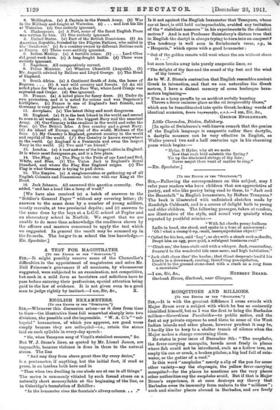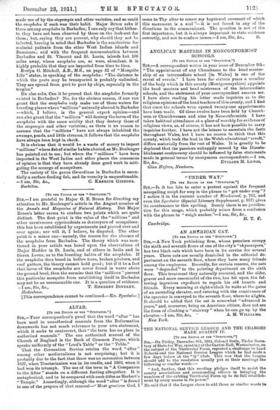MOSQUITOES AND MILLIONS.
[To TER EDITOR OF TRR "SPECTATOR." I Sin,—It is with the greatest diffidence I cross swords with Major Bruce over a subject with which he has so eminently identified himself, but as I was the first to bring the Barbados million—Gerardinus .Pocciloides—to public notice, and the first at my private expense to send them to some of the West Indian islands and other places, however prudent it may be, I hardly like to keep to a shelter trench of silence when the Major makes a charge concerning them.
He states in your issue of December 9th: " The anopheles, the fever-carrying mosquito, breeds most freely in places where fish could not be introduced, such as a hollow tree, an empty tin can or crock, a broken pitcher, a big leaf full of rain- water, or the gutter of a roof."
Is this word "anopheles " merely a slip of the pen for some other variety—say the stegonlyia, the yellow fever carrying mosquito P—for the places he mentions are the very places other authorities say the anopheles avoid. But if that is Major Bruce's experience, it at once destroys my theory that Barbados owes its immunity from malaria to the " millions"; such and similar places abound in Barbados, and are freely
made use of by the stegamyia and other varieties, and so could the anopheles if such was their habit. Major Bruce asks if there are any anopheles in Barbados; I can only say that hither- to they have not been observed by those on the look-out for them ; but, saying they are present, why should they not be infected, bearing in mind that Barbados is the sanatorium for malarial patients from the other West Indian islands and Demerara ; and with the frequent communication between Barbados and St. Vincent and St. Lucia, islands but 100 miles away, where anopheles are, or were, abundant, it is highly probable that they are imported from time to time.
Evelyn G. Mitchell, A.B., M.S., on page 52 of "Mosquito Life" states, in speaking of the anopheles : "The distance to Which the pests may be transported is probably unlimited. They are spread from port to port by ships, especially in the tropics."
He also asks, Can it be proved that the anopheles formerly existed in Barbados P No, for the obvious reason, if one can grant that the anopheles only make use of those waters for breeding places where "millions" naturally abound in Barbados —.which, I believe, is the general expert opinion—and can also grant that the "millions" will destroy the larva) of the anopheles with the same avidity that they destroy those of the stegornyia and other varieties ; as there is no reason to assume that the " millions " have not always inhabited the swamps, ponds, and little streams, it follows that the anopheles have always been kept in check.
It is obvious that it would be a waste of money to import " millions " where fish-of similar habits abound, as Mr. Boulenger has pointed out to me; but where the " millions " have been imported in the West Indies and other places the consensus of opinion is that they have already done good work in miti- gating the scourge of mosquitoes.
The variety of the genus Gerardinus in Barbados is essen- tially a surface-feeding fish, and its voracity is unquestionable.



































 Previous page
Previous page